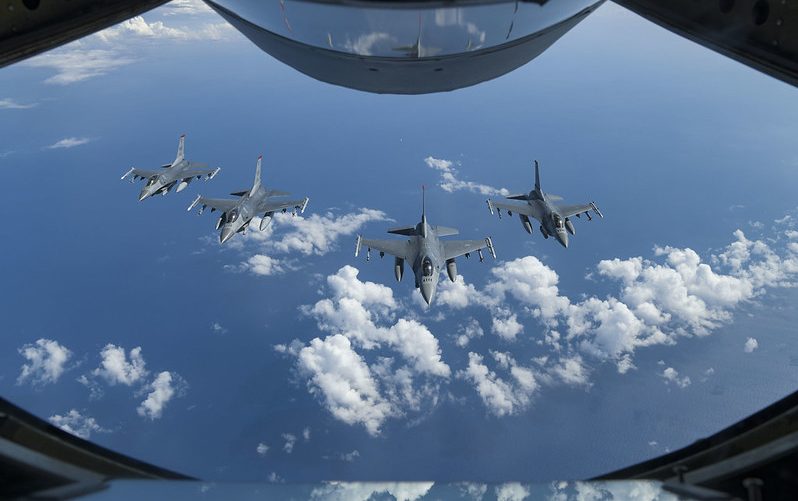In advocating a free, open and inclusive Indo-Pacific, Joe Biden has pushed for closer ties with like-minded nations across the maritime region, amidst China’s aggressive behaviour on the international stage. At the very core of this strategy, the American president has reached for a tool that was underused by his predecessor Donald Trump: the Quadrilateral Security Dialogue, or Quad, an informal security alliance comprising India, Australia, Japan and the United States (US). The most recent manifestation of this approach was seen in September when the grouping’s leaders held their maiden physical summit at the White House.
Under Xi Jinping’s leadership, China has moved radically away from the low-key diplomatic methods associated with Deng Xiaoping to an increasingly robust and assertive foreign policy. President Xi has particularly sought to use the Indo-Pacific region as a springboard for the country’s superpower aspirations – constructing notably military and industrial outposts on artificial islands in the South China Sea and deploying Chinese government ships outside Japanese territorial waters around the Senkaku Islands. In a bid to leverage China’s clout across the Indian Ocean, the Chinese Communist Party (CCP) has deployed ships, submarines and research vessels near the Andaman and Nicobar Islands, which India considers its backyard. Xi’s expansionist strategy has also seen China aggressively build new villages across the disputed Himalayan border with India. In parallel, the CCP has been considerably bitter towards Australia, conducting cyber-attacks on Australian government agencies and subjecting the Australian economy to a sustained and severe campaign of economic coercion. This dynamic has raised tremendous concern about the growing projection of Chinese power and underlined the need for liberal democracies in the region to harden their stance on China. In this article, I argue that for the Quad to effectively compete against the CCP, leveraging maritime cooperation and diplomatic engagement with Indo-Pacific countries will be vital to safeguard the rules-based regional liberal order.
Recommendation 1: Deepen maritime cooperation
With all four nations committed to the current rules-based economic order, based on the free flow of goods and services in the Indian and Pacific Oceans, enhanced maritime cooperation will be vital to upholding the rules-based regional liberal order. Deepening maritime defence cooperation is critical considering that the CCP has recently reinforced its strategic claim to islands and reefs of the South China Sea, unilaterally imposing new maritime rules on foreign vessels, which require advance notice before entering these waters. While Australia and the US have publicly rejected China’s new diktat, the current backdrop is indicative of the CCP’s desire to undermine the rules-based maritime order enshrined in international law.
Since the resurrection of the Quad, efforts have been undertaken to build naval interoperability. This has been particularly evident with the return in 2020 of the Royal Australian Navy to the Malabar exercise, which was previously a trilateral India-Japan-US practice. In August, the US-led Quad notably stepped up its operational footprint, gathering for four days of mega naval war games off the coast of Guam; which featured destroyers, frigates, corvettes, submarines, helicopters and long-range maritime patrol aircraft. This has not, however, prompted China to scale back its naval modernisation ambitions, which have grown exponentially in recent years – especially in new nuclear submarines, conventional submarines and new warships. Unsurprisingly, China has been particularly eager to demonstrate its naval power and test the resolve of the American establishment by regularly sending warships to the Taiwan Strait. As the CCP hopes to develop a world-class military force by mid-century, its ever-increasing science and technology budget, now the second-largest in the world, could certainly make this strategic effort a reality.
Looking ahead, the solution for the Quad lies in the well-written Advantage at the Sea – the latest tri-service maritime strategy (TSMS) issued by the US Naval Services. Distinctive in its provision of substantive information and analysis pertaining to China’s hostile maritime threat, the TSMS particularly emphasises the importance of American naval services leveraging naval capability building and operational execution with its closest allies in the region. With all bilateral Quad partnerships now including a Mutual Logistics Support Agreement (MLSA) – the building blocks are there to strengthen maritime relationships and develop operational flexibility.
Recommendation 2: Strengthen diplomatic outreach
China’s emergence as a rising illiberal power advancing its authoritarian model of state-led governance and economic development as a superior alternative for developing nations around the world, including in the Indo-Pacific region, poses a threat to the liberal values and fundamental freedoms enjoyed by the Quad. The CCP’s commanding influence is particularly visible through its Belt and Road Initiative (BRI) project. Launched in 2013, the BRI is an ambitious effort to increase infrastructure, trade and investment links between China and the global community. Southeast Asia is widely seen as a pilot area and regional platform for the success of Beijing’s geostrategic ambitions. Leveraging BRI projects for geostrategic gains is particularly salient in the Mekong, especially with regard to Laos and Cambodia, which are heavily dependent on China for their economic development. With political tides in both countries leaning towards Beijing, this backdrop has seen them oppose Vietnam’s call for a code of conduct in the South China Sea. This makes it exceedingly difficult to advance liberal values and norms in these countries.
China’s strategic projection across Indonesia is also increasingly noticeable. Despite tensions snowballing in late 2019 and early 2020, China’s COVID-19 pandemic diplomacy has certainly helped improve bilateral relations. As the pandemic began to ravage the globe in March 2020, China became Indonesia’s main supplier of much-needed personal protective equipment. Once vaccines became available in late 2020, the CCP provided the Widodo administration with millions of doses of the Sinovac vaccine and built regional vaccine production facilities across the archipelagic country. In addition to this, Indonesia has become a key Asian partner of China’s BRI projects, where Chinese investments have been targeted to boost the archipelagic country’s high-speed rail connectivity and airfield infrastructure. The Widodo administration is also considering additional BRI proposals such as Chinese funding for the Lambakan Dam in East Kalimantan. For Indonesia, Chinese investments represent a valuable opportunity, not only to improve the archipelagic country’s connectivity and infrastructure but also to enhance Indonesia’s position in the global market. That said, as Beijing has become Jakarta’s largest trading partner, there is a growing risk that the CCP will use its economic clout to push for foreign policy alignment. This could have profound geostrategic significance for the US and its competition with China in the Indo-Pacific region.
After widespread democratisation throughout the 1980s and 1990s shifting the complexion of the Indo-Pacific away from its illiberal past, the spectre of galloping state-led capitalism and centralised political controls from China risks shifting the balance of power in the region. With liberalism challenged – the Quad must leverage its diplomatic clout to prevent the CCP from further eroding the region’s liberal foundations. To this end, the Quad has sought to step up its COVID-19 vaccine diplomacy to disadvantaged countries in the Indo-Pacific. In addition, Australia and the US have pledged additional funds to help kick-start the economies of Southeast Asia. While these are positive developments, the grouping still needs to significantly leverage its economic and political power to prevent the CCP from further strengthening its growing geostrategic foothold in the region.
Sources Barrett, C. (2021), ‘Australia ‘must act’ to halt Indonesia falling under China’s sway’, The Sydney Morning Herald, June 10, 2021. Chang, F.K. (2020), ‘Uncertain Prospects: South China Sea Code of Conduct Negotiations’, Foreign Policy Research Institute, Pennsylvania: United States. Choudhury, S & Ng, A. (2021), ‘Asia is a priority for U.S. foreign policy as Washington shores up alliances’, CNBC, March 16, 2021. Department of the Navy United States of America. (2020), ‘Advantage at the sea. Prevailing with All-Domain Naval Power’, Department of the Navy United States of America, Washington D.C: United States. Galloway, A. (2021) Australia commits 10 million vaccines to south-east Asia, The Sydney Morning Herald, October 27, 2021. Joshi, Y. (2021), ‘The beating heart of the Indo-Pacific strategy is the South China Sea’, Observer Research Foundation, New Delhi: India . Joshi, Y. (2019), ‘China and India’s maritime rivalry has a new flashpoint: the Andaman Sea’, South China Morning Post, December 14, 2019. Knott, M. (2021) ‘We favour freedom’: Quad leaders offer China alternative at historic summit, The Sydney Morning Herald, September 25, 2021. Kuok, L. (2020), ‘Will COVID-19 change the geopolitics of the Indo-Pacific?’, The International Institute for Strategic Studies, London: United Kingdom. Maizland, L. (2020) China’s Modernizing Military, Council on Foreign Relations, New York: United States. Mushtaq, M. (2021), ‘China’s control over Sri Lankan infrastructure reignites fears’, Nikkei Asia, June 30, 2021. Panda, A. (2020), ‘Australia Returns to the Malabar Exercise’, The Diplomat, October 19, 2020. Panda, A. (2020) Indonesia’s Latest Natuna Islands Spat With China Should Be a Wake-Up Call for Southeast Asia, The Diplomat, January 28, 2020. Parama, M & Iswara M, A. (2020) Indonesia looks to China, S. Korea for medical supplies, The Jakarta Post, April 8, 2020. Powell, A & Widakuswara, P. (2021) Biden Expands US-ASEAN ‘Strategic Partnership’, VOA, October 26, 2021. Rakhmat, M.Z. (2020), ‘Growing ties between Indonesia and China may hurt US-Indonesia relationship’, The Conversation, October 26, 2020. Rej, A. (2021) ‘France-led Multination Naval Exercise Commences in Eastern Indian Ocean’, The Diplomat, April 5, 2021. Shotaro, T. (2021), ‘Chinese vaccines: Sinovac needs outweigh doubts in Indonesia’, Nikkei Asia, June 28, 2021. The Asahi Shimbun. (2021), ‘China sets record for activity near Senkaku Islands’, The Asahi Shimbun, June 5, 2021. The Times of India. (2021), ‘China aggressively building new villages in disputed borderlands in Himalayas : Report’, The Times of India, March 22, 2021. Widianto, S. (2021) China to import more Indonesian products to balanced trade, Reuters, January 13, 2021.








Be First to Comment